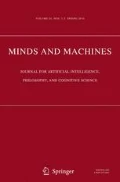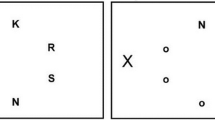Abstract
Do psychologists and computer/cognitive scientists mean the same thing by the term `information'? In this essay, I answer this question by comparing information as understood by Gibsonian, ecological psychologists with information as understood in Barwise and Perry's situation semantics. I argue that, with suitable massaging, these views of information can be brought into line. I end by discussing some issues in (the philosophy of) cognitive science and artificial intelligence.
Similar content being viewed by others
References
Agre, P. and Chapman, D. (1987), ‘Pengi: An Implementation of a Theory of Activity', in Proceedings of AAAI-87, Menlo Park, CA: AAAI Press.
Barwise, J. and Perry, J. (1981), ‘Situations and attitudes’, Journal of Philosophy 77, pp. 668–691.
Barwise, J. and Perry, J. (1983), Situations and Attitudes, Cambridge MA: MIT Press.
Barwise, J. and Seligman, J. (1994), ‘The Rights and Wrongs of Natural Regularity’, Philosophical Perspectives 8, pp. 331–364.
Barwise, J. and Seligman, J. (1997), Information Flow, Cambridge, MA: Cambridge University Press.
Brooks, R. (1999), Cambrian Intelligence, Cambridge MA: MIT Press.
Chemero, A. (2000), ‘Anti-Representationalism and the Dynamical Stance’, Philosophy of Science 67, pp. 625–664.
Chemero, A. (2003), ‘An Outline of a Theory of Affordances’, Ecological Psychology 15, pp. 181–195.
Clark, A. (1997), Being There, Cambridge: MIT Press.
Devlin, K. (1991), Logic and Information, Cambridge MA: Cambridge University Press.
Dretske, F. (1981), Knowledge and the Flow of Information, Cambridge MA: MIT Press.
Evans, G. (1982), The Varieties of Reference, Oxford: Oxford University Press.
Floridi, L. (to appear a), Is Information Meaningful Data? Philosophy and Phenomenological Research.
Floridi, L. (to appear b), Outline of a Theory of Strongly Semantic Information, Minds and Machines.
Fodor, J. and Pyslshyn, Z. (1981), ‘How Direct Is Visual Perception? Some Reflections on Gibson's’ Ecological Approach',’ Cognition 9, pp. 139–196.
Israel, D. and Perry J. (1990), ‘What Is Information?', in P. Hanson, ed., Information, Language and Cognition, Vancouver: University of British Columbia Press.
Jiang, Y and Mark, L. (1994), ‘The Effect of Gap Depth on the Perception of Whether a Gap Is Crossable’, Perception and Psychophysics 56(6), pp. 691–700.
Kirsh, D. (1991), ‘Today the Earwig, Tomorrow Man?’ Artificial Intelligence.
Marr, D. (1981), Vision, New York: Freeman.
Millikan, R. (1996), Pushmi-Pullyu Representations.
Millikan, R. (2000), On Clear and Confused Ideas, Cambridge: Cambridge University Press.
Reed, E. (1996), Encountering the World, New York: Oxford University Press.
Sedgewick, H. (1973), The Visible Horizon, Unpublished Doctoral Dissertation, Cornell University.
Smith, B.C. (to appear), The Age of Significance, Cambridge MA: MIT Press.
Stoffregen, T. (2000), ‘Affordances and Events’, Ecological Psychology 12, pp. 1–28.
Turvey, M. (1992), ‘Affordances and Prospective Control: An Outline of the Ontology’, Ecological Psychology 4, pp. 173–187.
Turvey, M. and Carello, C. (1986), ‘The Equation of Information and Meaning from the Perspectives of Situation Semantics and Gibson's Ecological Realism’, Linguistics and Philosophy 8, pp. 81–90.
Warren, W.H. (1984), ‘Perceiving Affordances: Visual Guidance of Stair Climbing’, Journal of Experimental Psychology: Human Perception and Performance 10, pp. 683-703.
Author information
Authors and Affiliations
Rights and permissions
About this article
Cite this article
Chemero, A. Information for Perception and Information Processing. Minds and Machines 13, 577–588 (2003). https://doi.org/10.1023/A:1026209002908
Issue Date:
DOI: https://doi.org/10.1023/A:1026209002908



